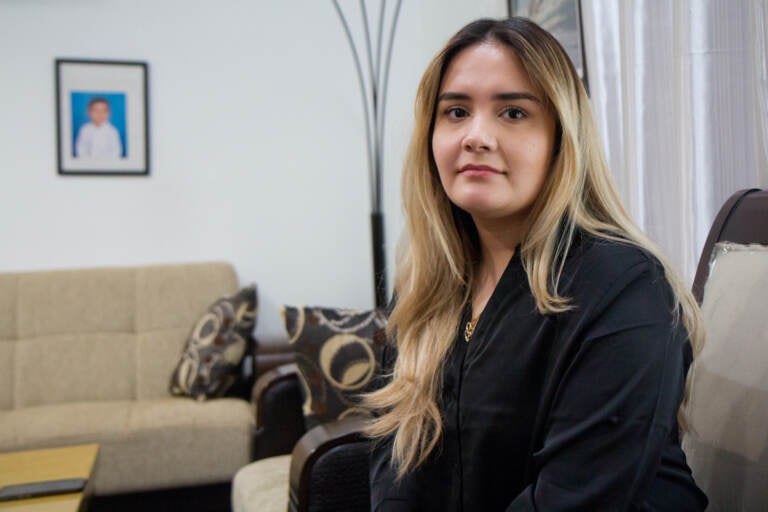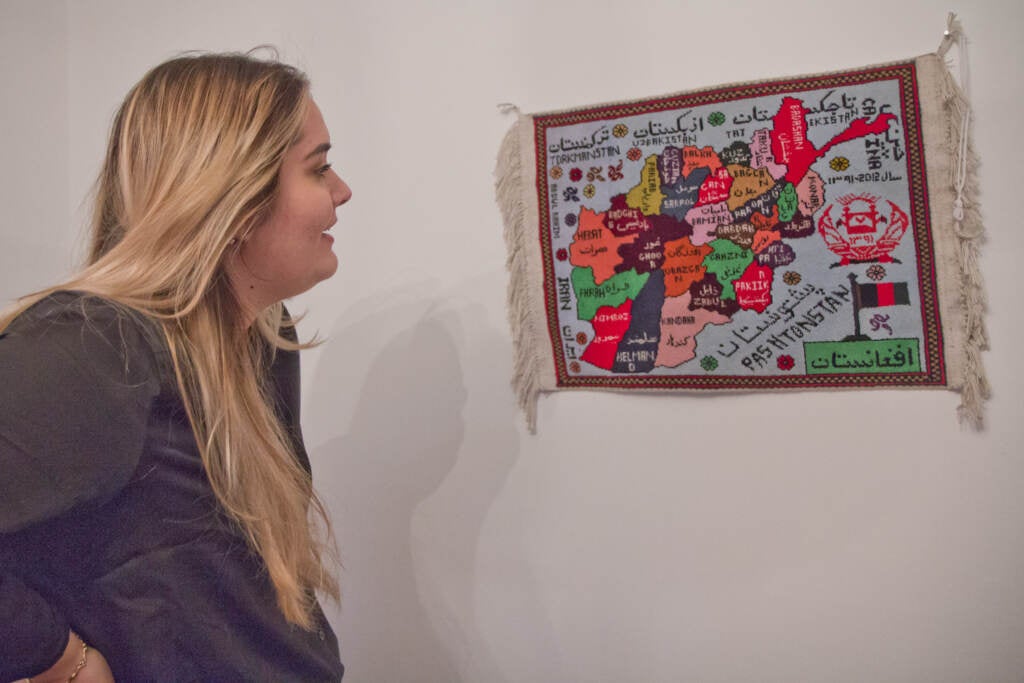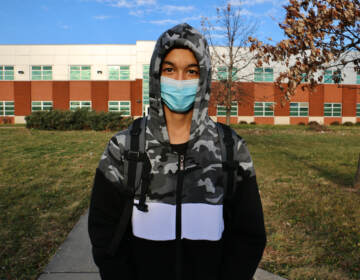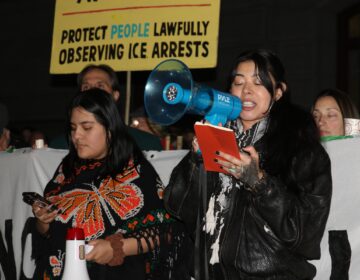Afghan families in Philly frustrated at high bar to help loved ones escape Taliban
Philadelphia families of Afghan residents left behind after the U.S. withdrawal last summer say efforts to get humanitarian parole are increasingly difficult.
Listen 5:01
Alaha Abdul Faruq, a full-time graduate student who's lived in Philadelphia for the past 14 years, is desperate to help her family living under the Taliban in Afghanistan. (Kimberly Paynter/WHYY)
Alaha Abdul Faruq, 23, is a full-time graduate student living in Northeast Philadelphia. Since the U.S. pulled out of Afghanistan last year, another thing has been added to her load: she’s become the spokesperson for her family, as they try to get two of her cousins out of harm’s way.
“We thought it wasn’t going to happen that fast and then it did,” she said of the Taliban takeover.
Her mother’s nephews, whose names WHYY is not using out of consideration for their safety, worked as security guards for the family of a high-ranking official in the old U.S.-backed government. That makes them targets of the Taliban now. One of their coworkers was shot shortly after the U.S. withdrawal, and the man’s father sent them a photo.
“[He] said, ‘You have to get out, because if you don’t this could be you,’” said Abdul Faruq. The picture now lives on her phone, along with other precious documents she hopes will be her cousin’s ticket out.

The two men went into hiding, changed their appearances, and are now among the thousands of Afghans in line for a kind of emergency clearance to come to the United States. Since last July, 40,000 Afghans have applied for something called humanitarian parole, according to U.S. Citizenship and Immigration Services (USCIS). But slow processing times and a high bar to qualify mean some in Philadelphia have been waiting for months with no word about their friends and family members’ chance to get to safety.
“Every time they ask us, ‘do you have any news? Do you have any news?’ and it’s the worst thing when you have to tell them, ‘no,’” said Abdul Faruq.
A last-ditch way out
In the days following the U.S. withdrawal, American officials such as Secretary of State Anthony Blinken pledged to create pathways for “at-risk Afghans” to continue to leave the country.
“There are a lot of things happening from the political to the practical to enable us to bring people out of Afghanistan who wish to leave,” he said, during a press conference on September 3, 2021.
The State Department estimated that the majority of the Afghans who actively worked for the U.S. military or N.A.T.O. forces had been left behind following the troop withdrawal. These allies are eligible for a pathway called a Special Immigrant Visa, or SIV. That process, however, can take years. In addition, there are thousands more who worked less directly for the U.S. apparatus, or for civil institutions such as human rights organizations or the press, who are now being targeted and do not have a straightforward path to safety.
In the chaos following the withdrawal, many turned to humanitarian parole as a last-ditch way out.
“It also seemed like the right mechanism for people who were still in Afghanistan to try to explain why they were at risk of persecution, why they were under threat,” said Jessica Oliff Daly, an attorney with the refugee resettlement group HIAS Pennsylvania. Her organization received calls from hundreds of clients, she said, who were looking to arrange safe passage to the U.S. for their family members.
There was also precedent. When the U-S airlifted people out of Kabul, it wound up granting humanitarian parole to the majority of the 76,000 thousand evacuees eventually brought to the United States. Once in the U.S., they have only temporary status and must apply for a pathway to permanent residency through an established channel, such as asylum or via family already in the United States.
But after the airlift, the bar to qualify seemed to stretch ever higher, said Oliff Daly.
In order to be eligible, applicants must be experiencing a “compelling emergency” with “an urgent humanitarian reason or significant public benefit to allowing you to temporarily enter the United States,” according to USCIS.
A USCIS spokesperson specified that it would not be able to approve applications for people currently in Afghanistan, because the U.S. no longer has an embassy or consulate there. However, leaving is difficult. Aid groups estimate thousands of Afghans are crossing illegally into Iran and Pakistan every day, and 500,000 were deported back to Afghanistan in the second half of last year, according to the United Nations.
To have a shot, applicants must also provide evidence that they individually face harm. Some examples given by USCIS include a media, government, or non-profit report specifically naming a person and spelling out why they face harm. Attorneys said that standard is higher than other humanitarian visa programs, and one that people fleeing persecution may have a nearly impossible time meeting. Finally, priority is given to those with immediate relatives already in the United States.
“There have been denials of those applications for the very reasons of lack of evidence, of people not having documentation or statements,” said Steven Larín, Deputy Director at Nationalities Service Center, which is assisting Afghans arriving in Philadelphia.
So far, only 160 of those 40,000 humanitarian parole applications have been approved for Afghans who applied from abroad, a USCIS spokesperson said. Another 930 were denied.
The agency stressed that parole was never supposed to replace the U.S. refugee resettlement program, and is only appropriate in “limited circumstances.”
Jason Hartwig, a veteran of Middle East wars and Ph.D. student in Philadelphia, has helped about 10 people in Afghanistan apply for humanitarian parole. He said he tries to be brutally honest about the odds of success.
“This is like a very low probability chance right now … But, I mean, what are you gonna say to someone in this position? They’re going to take that one percent chance,” he said.
The glacial pace and high number of denials have started getting attention. Late last month, Democrats and one Independent on the U.S. Senate Foreign Relations Committee sent a letter to the Biden Administration, criticizing the denial rate and saying the standards to qualify are unreasonably high.
Earlier this week, the federal government announced it would open a processing center in Qatar to try to speed up processing for at-risk Afghans. It’s not clear how applicants for humanitarian parole will be processed, and if they will be redirected to apply for refugee status. That program takes on average two years, according to the National Immigration Forum, and currently has a lengthy backlog.
Alaha Abdul Faruq, whose cousins are still in hiding, said “time is a luxury right now,” and one they cannot afford. In December, the Taliban visited her aunt and uncle’s house, looking for their sons.

Get daily updates from WHYY News!
WHYY is your source for fact-based, in-depth journalism and information. As a nonprofit organization, we rely on financial support from readers like you. Please give today.






